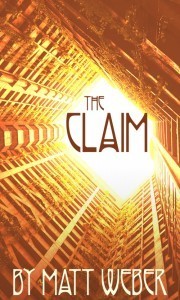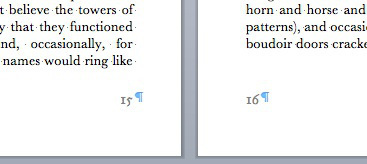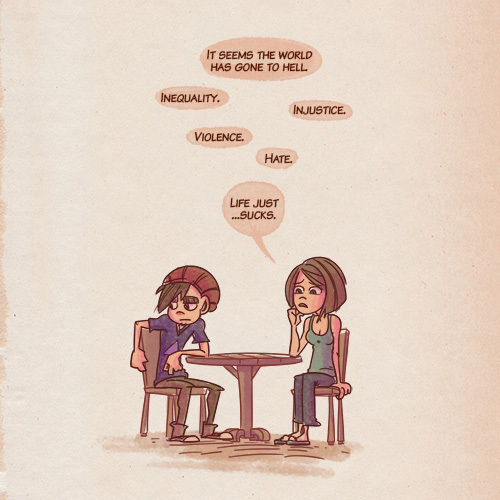Matt Weber's Blog, page 17
January 28, 2015
Words 1-28-2015
 The riot of battle done, Esker’s wound reasserted itself as he skulked along an alley of the claim. It was not bleeding too freely—it was a small wound, and his blood scabbed fast—but it was bleeding, and not a little, and who knew what might have been on the damned bullet? [[54]] He paused to notch the fabric of his trousers with the swordspear, then rip a long strip from it. He would look ludicrous, but there was no help for it. He packed the wound on both sides, then bound it.
The riot of battle done, Esker’s wound reasserted itself as he skulked along an alley of the claim. It was not bleeding too freely—it was a small wound, and his blood scabbed fast—but it was bleeding, and not a little, and who knew what might have been on the damned bullet? [[54]] He paused to notch the fabric of his trousers with the swordspear, then rip a long strip from it. He would look ludicrous, but there was no help for it. He packed the wound on both sides, then bound it.
He dug around in his satchel until he found the list of words that Ruth had given him. The annotations were better than he had remembered, split by places to look for from the streets and places to look for inside. On the streets, the recommendation was to look for a “hospital” or “school of medicine” or “department of life engineering,” probably in that order; inside, the words grew more finely focused, “acoustics” and “throat” and “force” and so on.
When Esker stood to go looking for them, he nearly fell. [[186]]
That was clear enough, then. He stood still until the black withdrew from the edges of his vision, then turned to make his way toward the nearest building, a four-story stone mansion with a crumbling red roof. Something nagged at the periphery of his vision, though. He turned all the way around to see a trail of drops. “The Nine preserve me,” he muttered, and forced himself farther down the path.
After what felt like an hour, he reached the end of it. The trail of drops was still visible in the [[dusk]] light, at least to his soldier’s eyes.
Something else was there too, farther back. He should not have been able to see it, not at that distance, not lurking so still; but it was etched on his eyes nonetheless, the hulking arms with tiny hands at the end, the lipless face with exposed gums and teeth.
He made his legs move faster. The black was returning to the edge of his sight. His limbs felt like lead, grudging things hanging from his torso, listening only at intervals to his mind; his throat tightened with lack of breath. There was no question of distancing himself any farther from the blood trail; he needed to be out of sight now, before he lost consciousness.
By the time he ascended the stair of yet another four-story stone mansion, he needed to lean on the door and drag a few ragged breaths into his lungs before he pushed the hanging door aside. He could smell the [[bloodbinder]], hear it breathing.
The foyer of the mansion was spacious, interrupted about two-thirds of the way back by a desk before the front stairs began. The walls were graven with the ancient script, discolored in rectangular spots where portraits or tapestries might once have hung; there was more recent sign here as well, old squatters’ fires, the scattered broken bones of birds, a cheap knife bent at the middle of the blade. Esker looked at the stairs, thinking to put some distance between himself and the ground, but they loomed like cliffs, his own blood the breakers lashing fruitlessly against them. He remembered the cliffs at Piko, white like these stairs, the water blood-dark except for where it foamed—and his own blood felt as icy as that striving water, though he knew the tides that kept it flowing were far from eternal. My heart is the moon, he said, and envisioned it exsanguinated, bled moon-white. Feeble moon. Weak tide.
Foyers have coatrooms, he thought, or closets; little spaces, hidden from the main thoroughfare. He stumbled off to the right and found a low wooden door opening on a long, narrow space. There were metal braces in the wall, he saw with satisfaction, though the rods and hangers must have been plundered long ago. He got over the door, then back into the very back of the closet. He thought he might turn around, so he could at least see if someone or something came for him. Then again, he thought after trying it, best to conserve strength. There was no point in seeing his killer, not when he was this weak. Not when he couldn’t see anything at all.
#
He awoke in a shabbier coatroom—or, not in it; before it. There was a palpable chill in the air, but not, he thought, from sparse blood—it was the chill of ice-kissed air, the fingers of draft that crept through the warmest house (and this was not the warmest house) and gave stealthy caresses at odd intervals. Esker had a sense that the coatroom was not usually unstaffed, and, further, that it was not at present unstaffed; yet there was no one there, only a sense of a presence. [[819]]
The racks were full of coats, though, and it was a right stroke of luck that they were numbered, for they were all the same: Thick wool coats, nearly ankle-length, in the brick-trimmed cerulean of the Jaidari army.
Esker looked around. The building was an odd patchwork of grey stone and wood—some intact, though unvarnished and none too well treated, and some burnt nearly to flinders, leaving gaping holes. Beyond the holes was a colorless, starless void.
He turned to the lobby, which seemed both vast and cramped. There was no one at the reception desk; but if there had been, he had a clear image of who it would be. One of the Salve Rooks, darker and smaller than the Creditors; plain of face, arms short and strong and well acquainted with the big Jaidari pistol and the stained machete that rested under the desk, within their reach. Flor, her name had been. She had dressed like one of the girls, in thin silk or linen, even though she stood her whole shift in the direct line of the cutting cold that roared in whenever the door opened.
He looked toward that door and saw her as she had been the last time he’d seen her, pinned beneath a scorched beam, her hair and half her face burned away.
From behind her slithered a white worm with John Dream’s face.
Esker reached for his swordspear, but it was nowhere to be found. He crouched back in a defensive stance, ready to fight. But the worm only gave him a needle-fanged smile, looking languorously around the lobby as though memorizing it.
“You have an unusual mind, do you know that?” the worm said. “Understand, I don’t mean to say you’re particularly intelligent, still less all that interesting. As intellects go, you’re more than pedestrian. But you’re hard to find.” It had been slithering for some seconds now and Esker could still not see its end, only coils on coils, leaving slime-trails on everything it touched. “Odd rhythms. It’s much easier to tell when you’re asleep—the distortions of the faster oscillations are much subtler. I’ve never spent much time inside a soldier’s mind, especially a sleeping one.” The worm reached its head out and took a nibble of charred flesh from Flor’s cheek. Pain shot through Esker; the whole scene trembled like an aspic. “You’ll remember her that way from now on. What do you think of that?”
“You’re an abomination,” said Esker. “But you didn’t need me to tell you that.”
“A rich charge, that, from a man with this in his mind,” said the worm. “Chilly here. [[1264]] The Tenoc campaign, I suppose. Don’t work so hard to hide it; I can tell when I hit and when I miss. Do you know why I’m here?”
“We didn’t part on good terms.”
“That’s true. But you can help me, maybe. I know you’re in your claim, for all the good that claim-deed did you. The old university. What have you found?”
“Buildings, dirt, and The Tungsten Kid,” said Esker.
“What buildings? Can you recall the letters on them?”
“I don’t read the old script,” said Esker. “It all looks the same to me.”
“You’re certain?” said the worm. It took another bite of Flor; again the world blurred and shook, again Esker’s body burned with agony. “It would take me a long time to destroy your mind this way. More time than it’s worth, really. Out there in the real world, do you think you’re screaming?” The worm smiled. “Ah, that does scare you. You are in the claim. You’re worried that they’ll find you.” It examined Flor’s corpse again. “This looks like someone would really look if they were crushed under a beam and burned to death. She’s not why you’re here. Your real reason for being here will look much worse than anything real. Why don’t you show me?”
Esker knew what the worm was doing, and for a moment, he felt his efforts against it begin to work; there was only a silhouette of the apparition in the middle of the lobby, barely visible.
The worm grinned and brushed him with a coil. Burning pain shot out from his wound, where it had touched; pain like a thousand barbs, taking residence in his flesh, promising more pain if anyone ever tried to pull them out. The apparition roared into life—the beautiful face that ended at a cooked-meat stump of neck, the burned skeleton.
“Now that,” said the worm, “is properly horrifying. What was her name? Ximena. And you were her… her john?” Its laugh was putrid with scorn. “But not just any john. You were in love. And you did this to her?” It smiled and licked its teeth with a pointed tongue. “Or might as well have. I’ll allow it. What shall I do to her? What can I do to her? You’ve already done quite a rough job there, old son. But she wasn’t always like this—”
—and there she was. Ximena, naked, whole, shivering in the chill. Shorter and lighter-skinned than Hasina, the Salve tattoo coiled about half of her face; [[1799]] Esker remembered tracing the tattoo with a finger as she rode him. Remembered moving his hands down from her plain face, over her rich, familiar curves, now so small and silly in this hideous dream.
“Esquer?” she said, meeting his eyes, then looking fearfully to the worm. His heart thrilled to the voice; sweet heat climbed up his spine. He was rock-hard.
“She’s dead,” Esker made himself say.
“I know,” said the worm. “But I can make her die a new way, in your mind. That skeleton image of yours is awfully dry—what do you think of remembering her half-eaten? I can leave some of the bigger organs dangling…”
“She’s dead,” Esker said again. “You’ve built her out of images in my mind. It doesn’t matter what you do. The only person you can hurt is me.”
The worm took on a thoughtful expression at that. “Sr. Sepherene,” it said, “as far as you’re concerned, the only person anyone can hurt is you. You’d like to think you can share someone’s pain, but all you’re doing is telling yourself a story about it. And maybe that story hurts you, and maybe it doesn’t. Luckily for me, though, I don’t care about Ximena. The only person I want to hurt is you.” There was a white blur; the air misted with slime, filming Esker’s skin; making him retch; the worm’s face was suddenly in his. “I think I’ll have that nose of yours. It won’t come off your real body, of course, but you won’t know the difference.”
It lunged. Esker ducked, stumbled back. It lunged again. Its white coils formed a fence around him, cutting him off from running farther into the house. He looked behind him; the only way that wasn’t blocked by coils was out. The void had been replaced by the same dead streets he had fled from, waking. Ximena was gone. He ran for the door.
The worm burst through it like a ram, scattering stone and charred wood for dozens of feet. It reared up on its endless body, looking at Esker from the height of a hill. Then it broke eye contact, looking around, as if taking the lay of the land.
Then a sound came, loud enough to split apart the earth and sky; and a shaking came, hard enough to jumble up the pieces past any recognition; and a light came, bright enough to sear it all into nothingness.
#
He was in the coat closet again—the empty one, in the mansion in the claim. His tongue felt like leather, his eyelids like sandpaper, his limbs like dead animals. Someone was holding his face, sloshing water over his mouth. Someone was mumbling.
“—answer me, dammit, just say something, anything, answer me, come on, answer me, dammit—“
The pale shadow crouching over him came into focus, if only for a moment. “Ruth,” he said.
“Hello, stranger,” she said. “Finally. Now drink.”
He moved a hand up to the waterskin; his arm still felt like something hanging on a hook in a butcher’s shop, but it did the job. He did not spill too much water on the ground.
“Can you shuffle back?” she said. “Just lean your back against the wall. Sit up.”
He did as she said.
“Dammit, dammit, dammit,” she said. “I can’t stay here. There’s food, some dried meat and bread, you can soften the meat up with water, or there’s a little bit of weak wine—“ she showed him another canteen—“and we’ll do our best to get more drops to you in the hospital. The wine is treated with something that will help keep your wound clean, so don’t be shy about drinking it. Do you remember how to find the hospital?”
“I have your list,” he said.
“I saw it on the way here. The fastest way to get there is to go through the Tungsten Kid’s camp. Don’t.”
He actually managed to cough a laugh at this. “It’s all right. I think he and I are really starting to get along.”
“Don’t.”
“I know.”
“The hospital. [[2351]] On the roof—we’re going to throw the drop across the claim-edge. That’s where the other ones will be. Don’t leave the claim, or they’ll know when you come back in.”
“You came.”
“No one saw you leave.”
He reached a hand up to her hair, brushed a stray lock. “You’re the most beautiful thing I’ve ever seen. I wanted to make sure I told you before I died.”
She took his hand and moved it away. “I don’t hold the ravings of the mad against them, but you’ve got to get yourself together.”
“How did you find me?”
“The blood.”
“Shit—” He tried to get up, failed, tried again, succeeded. But she blocked his path.
“You’re all right for a bit, I think. When I saw them, they were all gathered up around the Kid’s tent—maybe they’re worried about another attack.”
“Another attack.” Memories returned. “You shot the Epseris. When you realized you weren’t going to beat the Kid, you shot the Epseris.”
“Regrettable accident.”
“I heard you give the order,” he said. “‘Finish the killers.’ What else could you have meant?”
“I don’t have time for this,” she said, but his hand was around her wrist. She looked up at him, her eyes grave. “Let me go.”
“Did you mean just the Epseris, or did you mean Ozier and Kem and Inber too?”
“If I did mean your friends, which I didn’t, I wouldn’t tell you the truth while you had a hand on me,” she said.
He released her. He saw the blood rush back into the pale band his hand had left around her wrist; he’d gripped harder than he meant to.
Ruth took a deep breath. “I was born to the Pity Rooks outside of Ostn. When there were Pity Rooks outside of Ostn. Thanks to your Epseris brothers, there aren’t any more.”
Pity-the-sorrowing-daughters-and-wives sends his regards, Esker remembered. Ozier had been on that hunt too. Was Ruth not telling him, or did she not know? “I don’t harbor any love for the Epseris,” he said.
“I don’t care. I didn’t do it for you. I have to go.”
“Why?”
Ruth looked up at him, her mouth quirking, though not quite into a smile. “You want me to stay, is that it? Share some tack and jerky with the most beautiful thing you’ve ever seen?”
He made as expansive a gesture as he could inside the closet. “What’s mine is yours.”
“Here’s the difference between foreigners and Rooks,” said Ruth. “Foreigners offer to share food they’ve been given and pretend that it’s a favor. Rooks don’t take back what they’ve given, because they gave it for a reason; and they aren’t flattered by offers to tarry, because the best way for a foreigner to trap a Rook is to convince her to slow down and relax. When a Rook chooses to help you, you’ll get actual help, like food and medicine. Or you’ll get good information, like this: I can’t stay in the claim, or in the viejo, because I’ll fucking die. The air in these places is poisoned. If you hang around it, you’ll die soon or you’ll die later, but you’ll die badly. I’ve already been in here an hour longer than I should have.” She pointed to a patch on her shirt; it was almost entirely black, with hints of grey and white showing around the edges, as though it had been pressed into an ink pad. [[2955]] “This was white when I entered the viejo. I’m leaving.”
She took a step back, then turned. Esker carefully centered his weight directly over his heels, placed his fingertips on the wall to steady himself. “I’ve been in here for days without leaving,” he said. “What’s going to happen to me?”
Ruth turned around. There was real regret in her face, he thought, but beneath it there was something hard. “I don’t know,” she said. “Are you a father?”
Esker shook his head.
“Don’t become one,” she said.
“You weren’t ever going to tell me,” he said. “You don’t tell anyone. You just let people come and scratch for grubs in your cities and spend their money in your stores. What kind of life is that?”
“You don’t listen when I talk,” said Ruth. “Every time I see you, Esker Sepherene, I say ‘Hello, stranger.’ What exactly is it you think you mean when I say that?”
Esker had no answer. Ruth shrugged, turned, and left the closet.
He stood a moment, breathing, thinking.
“Shit!” Ruth cried from the lobby. Esker lurched to the front of the closet to see her hurtling past, pursued by a roil of flame. For a crystalline moment he was nearly offended: Why hadn’t she told him to get out? But, of course, that would have told the enemy that someone was there. A considerate little gesture, really. Maybe. Esker grabbed his swordspear and lazily clotheslined the runeslinger running down the hallway after Ruth. The hit didn’t do much damage, but it did put him on the ground, and even a wounded soldier could put a blade into the base of a downed man’s skull without much effort. He felt the slight chill of a ket attack roll over him; irritated, he threw the swordspear. It missed wildly, clanging against the stone of the hallway. The remaining ’slinger swore and ran.
Esker looked down at the dead runeslinger. “I’m afraid I can’t stay,” he said. He collected the food and drink that Ruth had brought him, then left the building by a back entrance into a yard that might once have held a garden; now it was dirt and dust and a few flower boxes on a fence. He got his bearings, then trudged away from the Tungsten Kid’s camp, hoping that a bit more distance might give him some safety. The prospects seemed rather slim, but he could not think of better.
#
After several blocks’ worth of stalking, waiting, and backtracking, Esker began to conceive of the claim as a band of relatively low danger in between a ring of elevated danger, on the claim-edge where patrols waited, and a center of maximal danger, where the Tungsten Kid resided and his followers concentrated. In a healthier state, he thought, it might be amusing to proceed along the claim-edge, murdering patrols where he found them. Then he thought that, in a healthier state, he wouldn’t think of things in terms of maximizing kills. In any case, he could only rely on his soldier’s protection for so long; his flesh yielded to steel and bullets like any ordinary man’s, and the Tungsten Kid would twig to that soon if he hadn’t already. Best to send the message that he wouldn’t bother anyone who didn’t bother him. It wasn’t a message the Kid was likely to hear, but it was a better survival prospect than declaring war.
Staying in that band of reduced danger, and waiting long and patiently for the streets to clear whenever he saw so much as one of the Tungsten Kid’s gang, Esker whiled away a not altogether unpleasant day picking his way to the claim on the other side of the camp. Soon he saw the ancient script for the hospital, and he dutifully found his way inside and climbed up to the roof. It was a large roof, but he checked the whole thing and double-checked the part closest to the claim-edge, and there was nothing.
At this point sleep was plucking at his sleeve again, as it did when his body was knitting itself back up. [[3646]] He left the roof and made himself find a little room several doors down a small, crooked hallway rather than falling asleep in the main corridor.
No sooner had his eyes closed than the white worm waited for him.
He dodged its lunge, then darted down the hall, taking every turn he could. After a few, he slowed down, listening. He didn’t lay eyes on it, but it felt close; he could hear the sucking of its slime-trail on the floor.
Voices outside Esker’s hiding place woke him. He refused to wait as they closed in; two slashes of the swordspear connected, leaving two of the three men in confusion, and the last one missed his shot. Esker hurtled down the hall in a wake of blood and oaths; when all opposition was out of sight, he wiped the swordspear to make sure it would not leave a trail of another man’s blood, as his wound had done of his own. He ran on, not knowing where to go or what he might do when he got there. Eventually he found a dead end at a bank of huge doors with no handles, nearly flush with the wall. One pair was wedged open, barely wide enough to let his body through. It opened on a dark, square hole—but there was a ladder running down one side, and the barest sliver of light at the bottom. He went down as far as he could go, until he reached a panel that was not quite flush with the wall—perhaps the top of a box of some kind, constructed to be almost exactly the size of the shaft. There was a panel in it. He imagined he could kick it in, or through it, and perhaps he would be on the ground floor of the hospital.
Instead, he waited there a very long time. Only when sleep threatened him again, in the quiet dark, did he move. The panel did, indeed, put him in a box, brushed metal studded with a panel of round buttons. The doors were closed, but with the swordspear as lever, he forced them open and found himself in the hospital again. There were still voices there, roving a bit near stairwells, but he had no wish to go up. He searched until he found an office with a window and none of the Tungsten Kid’s men outside; then he broke the glass and fled.
He wondered how long they would surround the hospital—how long it would be safe to look for the food drop. He wondered when he would sleep again. He wondered when his body would succumb to the poisoned air. He wondered, and he walked.
#
By the next sleep, it was a game. Within the band of reduced danger, he had put some distance between himself and the hospital, and found himself a room on the second story of a building with several identical rooms, each with a green slate board on one wall. Again, the worm waited in his dream; again it attacked, and again he evaded it. But now, as soon as he had evaded it, he did his best to wake, and managed to shake himself out of the dream on purpose.
January 9, 2015
link digest for january project, week 1
January 7, 2015
new year, new site, new project
TL;DR: I am writing, or furiously attempting to write, two novels in 20 days, and posting all first draft copy as well as daily notes and occasional essays to cobblerandbard.com. Come stop by.
Hi all. I’m a little late with this, mostly due to frantically getting things up and running the past few days, but I have things to say! And a place to say them! So I’m running out of excuses for not getting them said.
I have a new author site. I haven’t decided the division of labor between the sites yet; as I imagine it, Cobbler & Bard will be pretty business-focused, the Pulchrifex Papers will continue to aggregate random non-writing-related stuff that grabs my interest, and if C&B takes off then PP will probably slowly die. Further bulletins as events warrant.
For those of you who do follow this site in any measure out of interest in my fiction, you should know that NOT ONLY will C&B be hosting that stuff in general in future, BUT ALSO I have a huge writing and meta-writing initiative that I’m posting up there RIGHT NOW, and will be through all of January. This is surely the place to start—so surely, in fact, that it’s sort of mind-croggling that there isn’t a permalink to that somewhere on the blog page, ah well another thing to do oh god.
And I am now officially way over my allotment of social media time for the day. So I do sincerely hope to see you over at C&B, and please share and comment if you like what I’m doing.

November 15, 2014
books of interest, fall 2014
November 14, 2014
what happens to a bum like that?
October 21, 2014
the repetitious, misspelled incantations of thwarted desire
I forgot I’d written a Goodreads review of THE HAPPIEST TODDLER ON THE BLOCK, but someone “liked” it this morning and I went back to read it. Still pretty proud of it, I have to say. Dementia is setting in, though: I remember a few things about BLOOD MERIDIAN, but if I’m referring to anything in particular here, I’ve forgotten it.
(Why would I name-check BLOOD MERIDIAN in a review of a book about child behavior management? That’s what we call “clickbait,” son.)


October 3, 2014
the antidepressant effects of medieval weaponry
And you didn’t think you could use neuroscience to improve your life. (From Koenigs & Grafman, 2009.)


September 12, 2014
fear, love, obscurantism, neuroscience, and the watcher in the water
I’ve talked a little bit about Wattpad, but possibly not enough. It’s a social network for writers; I have some free work on it, and I’m a little bit active in a couple of discussion groups. The guy running those discussion groups, Jason Howell, was kind enough to ask me a few very sharp and kind questions about my own writing; inexplicably, on reading the answers, he decided to publish them anyway.
Part 1 of the interview is here. You don’t need a Wattpad account to read it. However, you do need one to vote and comment. Votes are the Wattpad version of “likes,” which is to say the currency of the realm, and Jason has done a lot to enrich other Wattpadders. If you really enjoyed the interview, it would be kind of you to join up and vote (which vote will go to him, not me).
If you already know you like my writing, you might also check out Jason’s, either on Wattpad or at his own pad. He works short, so the ante’s modest, and he’s tricky.


September 5, 2014
david foster wallace did not use scrivener
Ed Ditto’s tutorial on creating print manuscripts from Scrivener is required reading for self-publishers. It’s gotten me a huge portion of the way to formatting The Dandelion Knight for print, and I thank him for his service (and Garrett Robinson for the video version, which I haven’t watched yet but would like to one day). But, through no fault of Ed’s, the process fails at one step that is critical for me and perhaps no one else.
Footnotes.
I know. Let’s just stipulate that they’re necessary. But, if you’re compiling to PDF, Scrivener forces you into a Sophie’s choice with footnotes—use Proofing layout and lose some fonts (as well as some amount of control over whether your pages end up recto or verso, at least allegedly), or use Publishing layout and tolerate endnotes. I refused to give up IM Fell for my title page and chapter titles, and I refused to tolerate endnotes. So I opted to compile from Scrivener to Word.
Unfortunately, there are a few aspects of the conversion that weren’t great. They’re all manually fixable, but they do kind of need manual fixing. I’ll show some screenshots.
Problem 1: Author and title are too close to the main text.
Solution: This is easy but annoying—manually go through the headers and change them. Unfortunately, Scrivener makes each chapter heading into its own “section” and edits to one don’t propagate through the rest. I’ve tried to fix this in styles but haven’t managed to figure it out.
Problem 2: Footnotes are the same size as the rest of the text. (Oops, it looks like a useless hyphen has also crept in.)
Solution: Also easy, not annoying: Just put your cursor into a footnote, select all, and change the size.
Problem 3: Pages don’t always end on the same line. (In its “two pages” display, Word displays odd pages on the left and even on the right, because it starts with 1—so don’t worry that the odds and evens are on the wrong side or that the margins are reversed for recto and verso. At least, I think you shouldn’t worry.)
Solution: Select the entire main text, then go to Format -> Paragraph. Click “Line and Page Breaks,” then deselect “widow and orphan control.” You want to select all because the document is divided into different sections; the last thing you want them to do is treat widows and orphans differently!


August 28, 2014
being good to each other is so important
This comic came across my transom a few minutes ago. Click and read—there’s much more than just the single panel below. I’ll wait.
On the one hand, beautiful and indisputable. The power of kindness and understanding is formidable. These are values we try to teach our kids, and for the best of reasons, the repulsion of alien despots perhaps not least among them. And I love the art.
On the other… well, it was posted today, today being August 28, 2014. The referents in current events are clear enough, but in case you’re coming to this a few months or years late, let’s state them: the killing of Michael Brown in Ferguson, Missouri, and the subsequent overreaction by police to local protests; the recent bloodshed between Israel and Hamas; possibly the Ice Bucket Challenge.
Or, not quite. The referents in current events are the popular reactions to these events. Winehart (Swinehart? I’m assuming he’s “Nate S. Winehart”) is talking about the conversations he’s seeing his friends having. The parallel timelines in the comic aren’t about different things happening in Ferguson, they’re about different ways to react to a world where Michael Brown is dead.
And—it’s difficult to interrogate these sorts of sentiments without seeming to prove their point, but one of those reactions is much easier to imagine when the discussants are both white hipsters who like the same coffeeshop. Who’d want to spend the day together cloud-watching, sharing a movie and a sunset. Who are friends already, whose lives are only separated by different viewing angles on the same abstraction.
It becomes harder to imagine the pink timeline when the two friends have a complicated history. When they’ve hurt each other more than once, then tried to reconcile, then hurt each other again. When one has more often, and more grievously, taken the offensive. It becomes harder to appreciate the pink timeline in light of Ferguson when the joke, the sugar for the pill, is slavery.
I’m grateful for the comic. I’m glad Winehart (please tell me it’s Winehart) drew and posted it. I’m following his blog now because his art is amazing. But—look, I’m reading this book called OVERWHELMED, by Brigid Schulte, which has nothing to do with the ideas at hand except for this:
The overwhelm, they want people to understand, is not an epidemic of personal failures, of whiny moms unable to juggle work and home efficiently. It’s a massive structural failure, and it’s holding everybody back.
The persistence of the blue timeline is not an epidemic of personal failures, of peevish people unwilling to find empathy and common ground with others.
Except when it is. And sometimes it is. But not always, not even close.
Being good to each other is so important. No question. But part of being good is not always insisting on goodness from the other party. Part of being good is respecting justified anger. Part of being good is owning up to history.

























